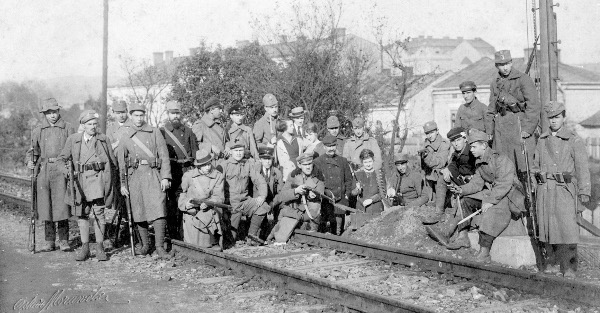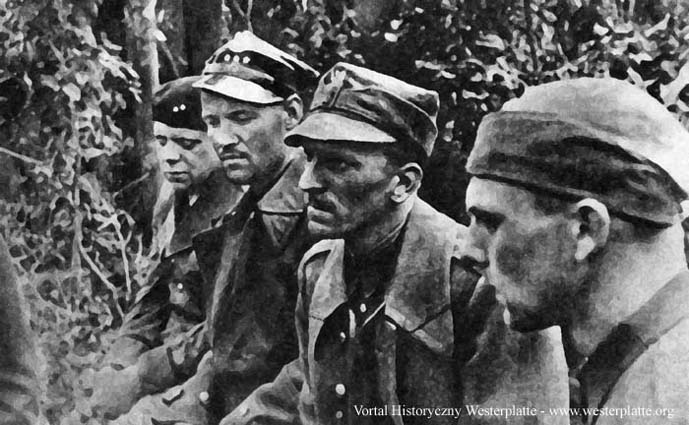Mieczysław Słaby and his brothers were heavily involved in scouting before the Great War and in scouting after Poland regained its independence. In Przemyśl this activity had an additional meaning. In November 1918, Polish-Ukrainian fights started and scouting groups were involved in these fights. Many young people from Przemyśl sacrificed their lives then. Mieczysław, at the age of 12, due to his age, did not fight in the armed struggle, however, as he was active in the supply units he was awarded the "Star of Przemysl".

Participants of the Polish-Ukrainian fights (photo: National Museum of the Przemysl Land)
After the period of peace, the future hero from Westerplatte, then a 15-year-old middle school student, joined the activities of the Scout Sports Club "Czuwaj" founded by, among others, his brother Franciszek Słaby. In 1924, the team in which brothers Franciszek and Mieczysław Słaby played, won the championship of ZHP.
A year later Słaby began his medical studies in Lwów and after finishing them he joined the army as a military doctor. In August 1939, Mieczysław Słaby, already in the rank of captain, arrived at the military depot at Westerplatte. The medical equipment he found there was at an alarmingly low level. There was a shortage of medical tools, bandages, medicines and, above all, operating tables. The depot was separated from Poland by the Free City of Gdansk. All orders had to be sent through Gdansk.
And the medical equipment that had just been ordered was requisitioned just before the outbreak of war. When on the first of September Westerplatte came under fire from the battleship Schleswig-Holstein, and a hail of bombs fell from the sky on defending soldiers, for Captain Slaby there came a week during which he had to pass the biggest exam in his life of heroism and medical craftsmanship. All accounts of the surviving defenders testify that Mieczysław Słaby passed this exam. Because he had to save soldiers' lives in incredibly primitive conditions, where even keeping wounds clean was a huge problem. The wounded lieutenant Pajak, whose abdomen was torn by the explosion, was operated on live, without anesthetics, using cosmetic scissors as clips of torn muscles. As the shocked German doctors later admitted, Dr. Slaby saved his life and that of many other wounded men.
After seven days of fighting Westerplatte capitulated. The defenders were sent to prisoner of war camps.
Due to lack of doctors, Weak was sent to a camp for non-commissioned officers in East Prussia (today most of the area where the camp was located is on the Russian side of the border). He stayed in the camp until the end of the war. Knowing German very well, Captain Słaby worked in the camp hospital. While in captivity, he contracted an ulcer that contributed to his death a few years later.
After the end of the war, Mieczysław Słaby returned to his hometown Przemyśl. As a professional officer and, additionally, a physician, he was immediately mobilized and assigned to the Border Protection Force, and a year later promoted to the rank of major. He also attended to civilian patients in the social insurance office and was a school physician in the School of Commerce. In his few free moments he helped his colleagues in the city hospital.
At that time, he moved with his sister and father to an apartment in Św. From this apartment, on November 1, 1947, Major Mieczysław Słaby was asked by the military policemen to report to the unit in Mickiewicza Street. However, he was escorted by a gas van to the headquarters of the Military In-formation, located in the Frenkel Villa in Dworskiego Street (until recently the headquarters of the ING Bank Śląski). There he was informed that he was arrested on suspicion of collaboration with the Freedom and Independence organization.
The major's family was not informed about the arrest, and they learned about it a day later from information circulated in Przemyśl. Mieczysław Słaby, as a hero from Westerplatte, was a very well-known and popular person in the town at that time.
Weak was held in the Przemyśl detention center for a month. The investigation against him was carried out with the use of very brutal methods, which the Stalinist terror of that time was famous for. Beatings with kidney bottles were an everyday occurrence. On December 1, 1947, Major was taken to Cracow and imprisoned in a tenement house in the Józefa street. After the arrest, his health deteriorated dramatically. While still in Przemyśl, his ulcer disease, which had been cured, became apparent again. In March 1948, the major's health deteriorated so much that he was taken to the Military Hospital. Unfortunately, it was too late. On March 15 Mieczyslaw Slaby died. He was buried in an unnamed grave in the Military Cemetery in Cracow. It was possible to determine the location of the grave because one of the
One of the nurses who were watching over the weakling in his last days of life, broke and put up a cross with his name and date of death written on it.
The arrest of Major Slabe was a consequence of the incriminating testimony of Kazimierz Sochański alias "Kulesza", the previously detained chief of military intelligence of the Freedom and Independence Organization. During the investigation conducted by the Military Information Services, Mieczysław Słaby also admitted to the charges against him, i.e. providing secret information to WiN and issuing forged medical certificates to the members of the organization. However, on the basis of the information gathered by a historian from Przemyśl, Mr. Zenon Andrzejewski, it seems unlikely that Słaby actually cooperated with the independence conspiracy. He spent the entire occupation in captivity, so he had no chance to establish any contacts with members of the resistance movement. Thus, he could not trust anyone who claimed to be a representative of the underground and offered him cooperation. He also knew that as a pre-war officer, the new authorities constantly looked at his hands. Especially, as already mentioned above, Slabby was a well-known man and any conspiratorial activity would be easy to detect. The testimony, which he signed during the investigation, is written in poor Polish, full of grammatical errors
and stylistic. Such qualities were characteristic of the confessions fabricated earlier by the military investigators, whose signature was forced under beatings and torture. Ill-treated prisoners often could not endure such interrogations and eventually signed whatever they were made to sign.
The question why "Kulesza" pointed at Weak remains unanswered to this day. It should be assumed that the investigation of his case was carried out with the same methods. But it is not known up to this day whether the charge against Major Slabe was fabricated by UB and forced during the investigation or whether "Kulesza" himself gave a name, breaking down under the pressure of questioning.
After Major Mieczyslaw Slabe's death, the communist authorities also tried to destroy his memory. His sister Waleria was prevented from transporting his body to Przemyśl. Słaby's name was almost banned until 1956. Later, if it had to appear in public, it was only in the context of the defense of Westerplatte. In the 1970s, it was admitted that Slaby was arrested as a result of an "unfortunate coincidence." It was not until the 1980s that Zenon Andrzejewski began to write openly
The investigation was first reported in 1981 in "Wroclaw Catholic Weekly" and in 1988 in "Polityka". The major's remains were never brought to Przemysl. It lies .
in a restored grave in the cemetery in Krakow.
Today the sports stadium of "Czuwaju" and the medical school in Gdansk bear the major's name. Gdansk and Przemysl also have Major Mieczyslaw Slabe streets.
text: Piotr Gduła, portalprzemyski.pl, based on the book "The doctor from Westerplatte"



